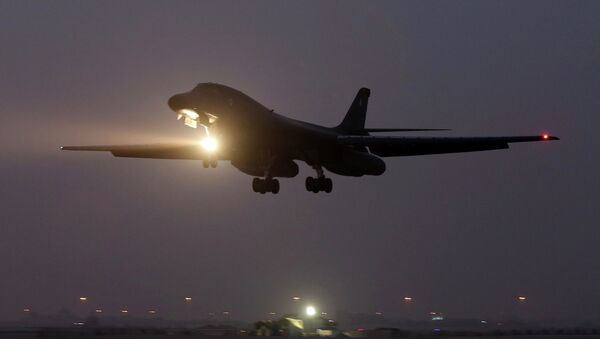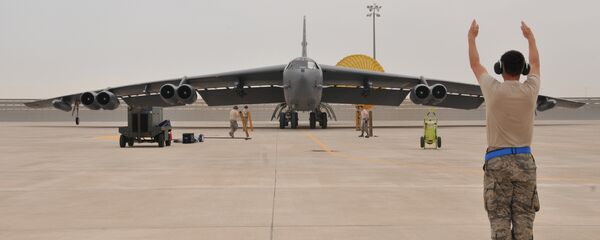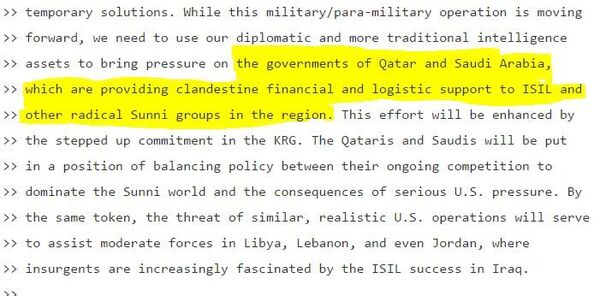Qatar was accused of a litany of wrongdoings by Saudi Arabia, Egypt, Bahrain and the United Arab Emirates on June 5.
"We are opting out of some military exercises out of respect for the concept of inclusiveness and shared regional interests," US Central Command spokesman Col. John Thomas told the AP in a statement Friday, adding, "we will continue to encourage all partners to work together toward the sort of common solutions that enable security and stability in the region."
The nature of the exercises that have been affected has not been publicized.
"US officials could be using a pressure point to express their frustration that what they see as a needless crises and a distraction from far more urgent regional issues is going on so long," Kristian Coates Ulrichsen, research fellow at Rice University, told the wire service.
Cancelling collaborative exercises "is likely an indication to longstanding security and defense partners that US patience on this spat is not open-ended and is rapidly drawing to a close," Ulrichsen noted.
One possible war game that may be impacted by Friday's decision is Eagle Resolve, which the Defense Department described April 18 in a news release as "the leading engagement between the US and [Gulf Council Cooperation] nations to collectively address the regional challenges associated with asymmetric warfare in a low-risk setting." The exercise has been held annually since 1999.
Nations boycotting Qatar have not acknowledged the decision, while Qatari officials have yet to provide an official statement, Military.com reports.
Divergent views on the Qatar dispute
US President Donald Trump said June 6 via Twitter "So good to see the Saudi Arabia visit with the King and 50 countries already paying off. They said they would take a hard line on funding extremism, and all reference was pointing to Qatar. Perhaps this will be the beginning of the end to the horror of terrorism!"
Dana Shell Smith, US Ambassador to Qatar and diplomat for two-and-a-half decades, promptly quit from her post June 13. "This month, I end my 3 years as US Ambassador to #Qatar. It has been the greatest honor of my life and I'll miss this great country," Smith said via Twitter. After Trump's diplomatically explosive outburst, the @USEmbassyQatar Twitter handle tweeted "seems a good time to RT this one":
— Chargé William Grant (@USAmbQatar) October 26, 2016
Two minutes later, @USEmbassyQatar tweeted, "And this":
— U.S. Embassy Qatar (@USEmbassyQatar) October 26, 2016
Following Trump's tweets, US Air Force Secretary Heather Wilson maintained US operations out of Doha, Qatar — where the Al Udeid Air Base makes a home for US Central Command — stated operations wouldn't be impacted whatsoever. "It's largely a diplomatic issue," Wilson said.
Reporting from Al Udeid, The Washington Times' Guy Taylor reported October 5: "The base is technically Qatari property playing host to the forward headquarters of US Central Command. But there is little question that its sun-drenched expanses, hosting about 11,000 US personnel, represent one of the U.S. military's most enduring and most strategically positioned operations on the planet."
WikiLeaks' revelation that both sides funded terror
One of the most crucial charges levied against Qatar, that it supports terrorism with funding, has been somewhat true — but Saudi Arabia has funded its own fair share of financing radicals.
"We need to use our diplomatic and more traditional assets to bring pressure on the governments of Qatar and Saudi Arabia, which are providing clandestine financial and logistical support to [Daesh] and other radical Sunni groups in the region," former Secretary of State Hillary Clinton wrote in an email to confidante John Podesta.
"The Qataris and Saudis will be put in a position of balancing policy between their ongoing competition to dominate the Sunni world and the consequences of serious US pressure," Clinton wrote in comments that now appear prescient.





